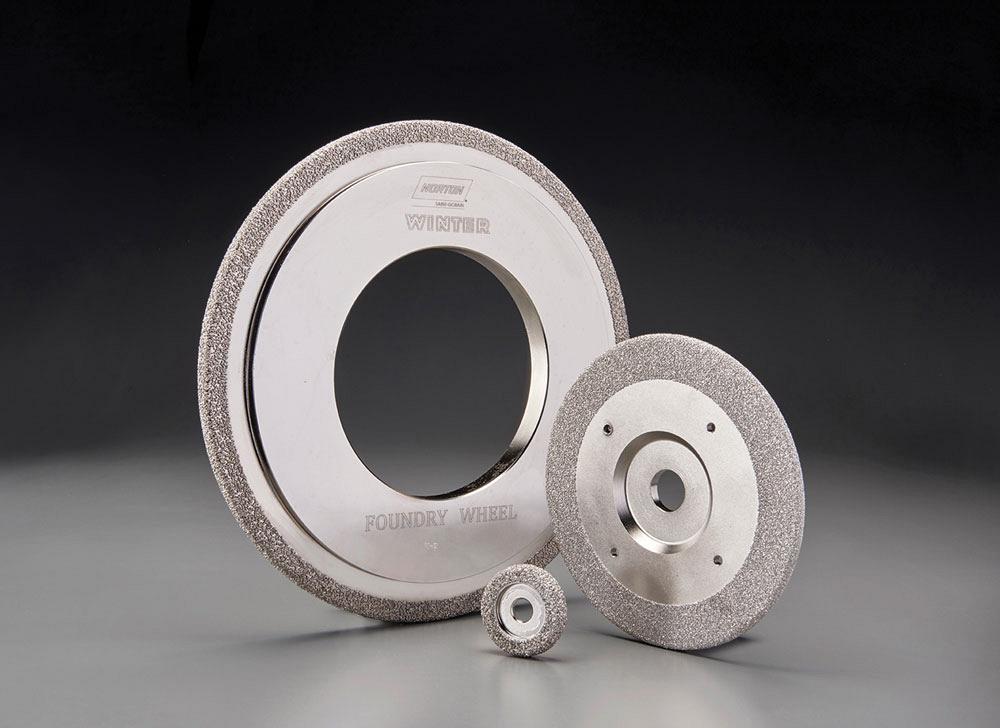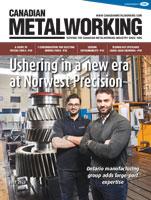Corporate Application Engineer
- FMA
- The Fabricator
- FABTECH
- Canadian Metalworking
Seeking manufacturing sustainability
Only by understanding sustainability can manufacturers benefit from it
- By Christian Murphy
- August 18, 2023
- Article
- Metalworking

Using the correct abrasives and process parameters lead to better-quality parts, shorter cycle times, longer wheel life, and less energy consumption. Khanchit Khirisutchalual/iStock/Getty Images Plus
Sustainability is a topic on nearly everyone’s minds these days.
Many large manufacturers and end users are evaluating their upstream suppliers in an effort to lower their Scope 3 emissions. Scope 3 emissions are a company’s indirect emissions; those that are generated from sources that are not directly owned or controlled by the company.
Having a more sustainable product can make a small to medium-sized manufacturer or job shop more favourable over its competitors, as it will help produce a more favourable life cycle assessment (LCA). LCAs quantify the environmental effects that come from material inputs/outputs, such as energy use and emissions. They encompass a product's entire life cycle with the goal of assisting buyers in making decisions that are better for the environment.
It about more than good PR, too.
Understand Emissions
Sustainability is something we at Norton |Saint-Gobain are deeply rooted in as a manufacturer and company as a whole.
We have signed a pledge to be carbon neutral by 2050, with an interim goal to reduce Scope 1 and 2 emissions by 33 per cent and Scope 3 emissions by 16 per cent by 2030. Scope 1 emissions come from sources that a company owns or directly controls, such as fuel consumption (unless the vehicles are electric). Scope 2 emissions are caused indirectly by a company through the energy, such as electricity, it purchases to use.
As of now, Norton |Saint-Gobain is achieving its goals largely through using green energy networks and improving power sources at its facilities.
Not only are these changes reducing our emissions significantly, but we are also experiencing cost savings caused by more efficient processes. As a manufacturer, Norton has a responsibility to operate in a sustainable manner, and, in many cases, going green can actually be more cost-effective.
One easy way for a manufacturer to lower Scope emissions is by shortening its supply chain.
For example, one area that has led to sustainability improvements within Norton’s supply chains is the transportation of raw materials and end products. The fewer places an object needs to travel, the fewer emissions from transportation will be produced, and the lower the Scope 3 emissions will be. By keeping supply chains shorter and more locally sourced, companies are able to reduce the need to ship materials long distances.
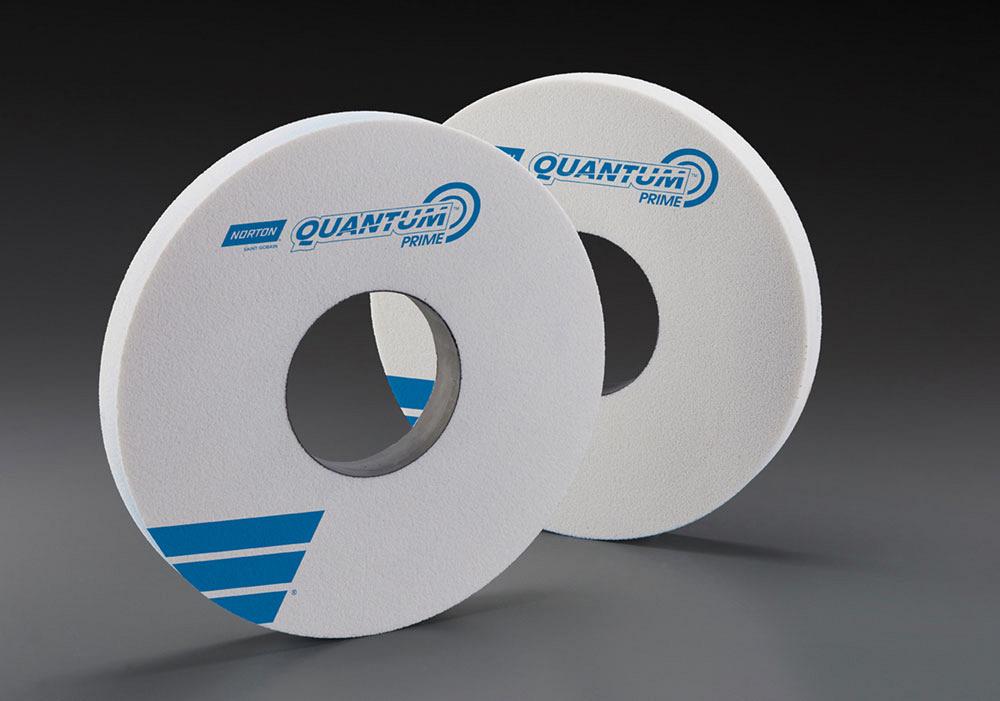
Norton Quantum Prime grinding wheels have a proprietary nano-crystalline ceramic grain, which improves productivity in numerous applications. Norton | Saint-Gobain Abrasives
There are other ways to be a more sustainable manufacturer besides reducing emissions.
New Grinding Wheel Technology
Over the years, Norton has made some raw material replacements to eliminate hazardous materials from its products and processes, while maintaining and improving their performance. Additionally, the company has strived to reuse and recycle as many plates and cores as possible.
Also, increasing the G-Ratio (the volume of material removed divided by volume of wheel wear) of the company’s abrasive products is always a target throughout development. It not only allows the end user to save on costs, but it also directly leads to reduced carbon emissions through the manufacturing, transportation, and disposal of fewer products.
Norton also aims to develop new grain and bond technologies to allow for more efficient grinding processes.
New technologies released by the company over the past couple years have reduced power consumption and are able to significantly reduce dressing frequency. This is in addition to investigating the use of bio-sourced materials in its products.
It’s important to select a grinding wheel based on the work material and the application. Using a wheel with grains that will self-sharpen with the given forces in the grind zone is important to promote efficient grinding. Similarly, using an abrasive product with the incorrect grade leads to more rubbing and less cutting, which leads to burning and increased in power consumption, or excessive wheel breakdown, which affects form holding and wheel life.
Utilizing the right abrasive product and process parameters can lead to better-quality parts, shorter cycle times, longer wheel life, and less energy consumption. These all help a manufacturer reach its sustainability goals.
Reducing waste is a major part of lean initiatives. It also plays a role in sustainability.
Some large areas of waste in grinding include producing scrap and using abrasive products with poor wheel life, excessive dressing parameters, and inefficient grind cycles. Eliminating excessive dressing parameters can extend wheel life and reducing cycle times leads to less power consumption.
Regularly evaluating the process for efficiency can be a good way to reduce waste, which often goes hand in hand with cost savings.
Christian Murphy is corporate application engineer, Norton | Saint-Gobain Abrasives, 1 New Bond St., Worcester, Mass. 01606, 508-795-5000, www.nortonabrasives.com.
About the Author
Related Companies
subscribe now


Keep up to date with the latest news, events, and technology for all things metal from our pair of monthly magazines written specifically for Canadian manufacturers!
Start Your Free Subscription- Trending Articles
Sustainability Analyzer Tool helps users measure and reduce carbon footprint

GF Machining Solutions names managing director and head of market region North and Central Americas

Mitutoyo updates its end-user portal

Enhance surface finish with high-speed machining
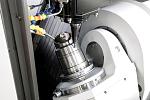
CME's Health & Safety Symposium for Manufacturers
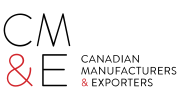
- Industry Events
Automate 2024
- May 6 - 9, 2024
- Chicago, IL
ANCA Open House
- May 7 - 8, 2024
- Wixom, MI
17th annual Joint Open House
- May 8 - 9, 2024
- Oakville and Mississauga, ON Canada
MME Saskatoon
- May 28, 2024
- Saskatoon, SK Canada
CME's Health & Safety Symposium for Manufacturers
- May 29, 2024
- Mississauga, ON Canada













